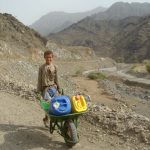The Gaza Strip has entered a “worst case” food crisis, with its population now facing famine, according to a July 29 Integrated Food Security Phase Classification (IPC) alert. Responding to growing international outrage over the emergency, two days earlier, Israel said it was reopening humanitarian aid corridors—allowing international organizations to resume convoys—while the Israeli Defense Force announced a daily “tactical pause” on operations in densely-populated Gaza City, Deir al-Balah, and Mawasi to facilitate aid distribution.
Bridging Evidence and Policy (BEP) Seminar Series: Crises and Response – Development and Humanitarian in the MENA
Vulnerable communities in the Arab world and MENA region face numerous challenges, including conflicts, resource scarcity, and inequality which exacerbate their situation. The COVID-19 pandemic, rising food prices due to conflicts, natural disasters, and ongoing conflicts in Yemen, Sudan, and Palestine further hinder development opportunities in the region
Is Humanitarian Food Aid Enough to Tackle Food Insecurity in Yemen?
Francesco Di Bona - MA in Development Economics and International Studies, Friedrich-Alexander Universität Erlangen-Nürnberg, Germany
In crisis and conflict contexts, food assistance is used as a main form of humanitarian aid. Food insecurity can be tackled directly through food basket transfers or school feeding programmes, or indirectly through cash or voucher transfers, with the latter that can be redeemed in supermarkets. Lately, cash transfers have been on the rise as a humanitarian food aid measure. The World Food Programme (WFP) has been [...]
Yemen: Economy-wide impact of conflict and alternative scenarios for recovery
Lina Abdelfattah – IFPRI
This is a summary of a regional program policy note published by IFPRI titled “Yemen: Economy-wide impact of conflict and alternative scenarios for recovery”. [...]
Policy seminar: Exploring a cash transfer program’s impacts on malnutrition in war-torn Yemen
Katarlah Taylor - IFPRI Senior Events Specialist
The war in Yemen is an ongoing disaster for its people. Over 80% of the population currently requires humanitarian or protection assistance, making it the worst such crisis in the world, according to the UN Office for the Coordination of Humanitarian Affairs. With two thirds of all districts experiencing pre-famine conditions, and 20 million people food-insecure, the question of how best to deliver food assistance is paramount. A Sept. 5 IFPRI seminar explored [...]





